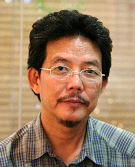Q and A: Dr Ooi Kee Beng, the deputy director of the Institute of South-east Asian Studies, talks to P N Balji about why Malaysia-Singapore relations is on a high, how attitudes on both sides have changed and whether the abang-adek relationship is still a simmering factor.


A. One should perhaps start by asking why relations between the two should not be cordial. There are several answers to that, but what should be borne in mind at the same time is that the need each has of the other in various ways is too strong for mutual enmity to be a permanent feature of their relationship.
While one is a city-state that is also a tiny island, the other is a conglomerate of 13 states, nine of which perceive themselves as sultanates. Of the remaining four, Sabah and Sarawak were regions at par with the Federation of Malaya when they came together along with Singapore to form Malaysia in 1963; while Penang and Malacca both have a long unique history of their own. Singapore was created by the British to be the centre of power, and so, in 1963, its people had reason to see the city as the metropolis for the British Nusantara. It had to play a central role in the building of Malaysia, which in practical terms meant that a common market was necessary. Once that failed, Singapore’s economic and cultural future within the federation did not look bright.
While the non-Malay population in West Malaysia envisaged a simple and smooth transition from colonialism to multicultural nationalism, the Malay community at large continued to have a strong sense of apartness from the global economy that the colonialists represented. Their political consciousness was still sultanate-based, and their ethnic identity was religion-based, which did not relate easily to the metropolitan, secular, multicultural political economy of a modern state. This difference in group consciousness spelled out different routes and different speeds in developmental strategies. In that sense, although one may talk about how the two countries had a joint history, the differences have been more compelling and relevant than the similarities have been.
As long as the differences were denied, relations between the two tended to be antagonistic. The supposed deep similarities raised a lot of false hopes and a lot of unreasonable expectations.
Over time, the differences have become more and more obvious—a process that was very much delayed by the fact that the antagonism between early leaders was prolonged by their extended time in power.
With new leaders, and with the growing importance of the complex regional context in which national politics and economics exist, there is a greater tolerance of the differences between the two countries, and a greater realisation of how much synergic advantage can be gained from working together.
Q, How does the Malaysian establishment view Singapore these days?
A. A complex of anger, incomprehension, irritation and envy does remain in how Singapore is viewed by its neighbor up north. But there is now a clearer acceptance that there is nothing much Malaysia can do to Singapore without hurting herself. The obvious advantage of having a wealthy and dynamic island at one’s doorstep is now being accepted. What Singapore does not have, Malaysia can offer her, be this lack of land; investment opportunities at medium cost; unskilled, semi-skilled or skilled labour; or landed properties.
Q. Do you think the abang-adek relationship, as seen by Malaysia, is not a factor anymore?
A. This is not much of a factor today. Such an attitude is rare among young Malay leaders, and would in fact be very unbecoming if found in new leaders.
Q. Has Singapore become more careful, more nuanced, in its relationship with Malaysia?
A. Yes, it has. Malaysian politics is often street politics in the sense that statements are made spontaneously for whatever immediate effect it might have. Reacting quickly to such statements forces things to a head, with no side wishing to back down for matters of pride—personal and national.
Singapore is less reactive on that front nowadays.
Q. The relationship soured when Dr Mahathir and Lee Kuan Yew were the prime ministers. What was their problem?
A. They both reflected the viewpoints stated in my answer to the first question. What is sometimes forgotten is that Mahathir fought with every one of Malaysia’s PMs and DPMs excepting Tun Abdul Razak, who died early. So, for him to be antagonistic towards a small neighbor like Singapore, whose leader had dared imagine becoming a major leader in Malaysia, should not be considered strange.
Dr Ooi Kee Beng is a Swedish citizen who was born and raised in Penang. He is also editor of the Penang Monthly published by the Penang Institute.


